Wisconsin Artisan Cheese
A Guide to the State's Finest Dairy Delights
Wisconsin boasts a rich tradition in cheese (how long does cheese last?)making, cementing its reputation as a hub for artisan cheese (What wine goes well with cheese?). Local cheesemakers, in the hundreds, are dedicated to the craft, producing a diverse array of cheeses that are recognized globally for their quality. This tradition is woven into the very fabric of the state's culture and economy, with cheesemaking expertise handed down through generations. The result is a range of artisan cheeses that encapsulate the state's dairy heritage, from creamy cheddars to bold blue cheeses, (What wine goes well with blue cheeses?) each reflecting the local terroir and the meticulous care of its maker.
The state's artisan cheese is not just a local delight but a destination for enthusiasts from around the world. Cheesemakers in Wisconsin draw from time-honored methods while embracing innovation to create cheeses that are both unique and traditional. This melding of old and new is evident in facilities where state-of-the-art technology and age-old techniques are employed side by side. For instance, some make cheese using raw milk and natural aging processes to develop complex flavors and textures, typical of the artisan approach.
Artisan cheeses from Wisconsin are crafted from the highest quality milk, sourced from local dairy farms. This close relationship between dairy farms and cheesemakers ensures a fresh supply of raw materials while supporting the local economy. Cheese artisans take great pride in producing 100% Wisconsin cheese, a testament to the state's commitment to purity and excellence in its dairy products. Each cheese is not only a treat for the palate but also a celebration of Wisconsin's enduring dairy heritage.
History of Wisconsin Artisan Cheese
Wisconsin's rich dairy heritage and the state's ongoing relationship with the American Cheese Society have shaped its artisan cheese landscape. Here, the past and present converge to mold a culture renowned for its diverse and high-quality cheeses.
Early Dairy Heritage
Wisconsin's journey into cheesemaking began with European immigrants, who brought their cheesemaking expertise in the 19th century. These settlers laid the foundation for the state's dairy industry, introducing cheese varieties such as Gouda and Edam. Cheese production flourished, and by the 1920s, Wisconsin hosted over 2,800 cheese factories. Innovations in the field led to the creation of original cheeses like Brick and Colby, which are now staples in the Wisconsin cheese family. In a move to maintain high standards, Wisconsin became the first state to grade its cheese for quality in 1921.
American Cheese Society Influence
The growth and sophistication of the state's artisan cheese sector have been significantly influenced by the American Cheese Society (ACS). Established in 1983, the ACS has played a pivotal role in the development of American artisan cheese, including those from Wisconsin. The organization provides a platform for Wisconsin cheesemakers to share knowledge, uphold quality standards, and showcase their products at national and international levels. The state's cheeses often feature prominently at the ACS's annual competitions, highlighting Wisconsin's status as a leader in the artisan cheese community. This relationship has fostered innovation and excellence within Wisconsin's artisanal cheese industry.
Types of Wisconsin Artisan Cheeses
Wisconsin's cheesemaking expertise is renowned, offering a diverse array of cheeses that bear the state's signature combination of tradition and innovation. With a focus on flavor and quality, Wisconsin's artisan cheeses evoke a sense of history and place.
Emmentaler and Swiss Tradition
Wisconsin cheesemakers craft Emmentaler cheese, a classic variety originally from Switzerland. Known for its mild, slightly nutty flavor and distinctive holes, or "eyes," Wisconsin Emmentaler adheres to traditional methods, including the use of a swiss copper vat. This practice imparts a rich, complex flavor profile to the cheese, distinguishing it from its counterparts.
Flavor: Mild but distinctively nutty
Texture: Smooth and firm with 'eyes'
Uses: Ideal for sandwiches and fondue
Colby and Brick Cheeses
Colby, a Wisconsin original, is a semi-hard cheese that was invented in the state at the end of the 19th century. It boasts a gentle, creamy flavor and a softer texture compared to cheddar.
Flavor: Gentle and creamy
Texture: Semi-hard, moist, and softer than cheddar
Origin: Created in Colby, Wisconsin
Brick Cheese, another Wisconsin creation, presents a unique profile with a range of flavors from mild to pungent, depending on its age.
Flavor: Ranges from mild when young to pungent as it ages
Texture: Soft and crumbly with age
Aging: Flavor intensifies with aging
These cheeses represent the heritage and artisanal craftsmanship that Wisconsin brings to the American cheese landscape, underlining the state’s ability to honor traditional cheesemaking methods while infusing local character.
Artisanal Cheesemaking Techniques
Wisconsin artisan cheesemakers honor tradition by incorporating time-honored techniques and meticulous hand-crafting into the production of their cheeses.
The Role of Copper Vats
In the domain of artisan cheese, copper vats play a critical role. Artisan cheesemakers favor these vats for their superior thermal conductivity and control, which is paramount in the delicate process of cheese curd formation. Copper interacts with milk on a molecular level, enhancing the development of texture and flavor characteristics typical of certain European-style cheeses.
Affinage: The Art of Aging
Affinage, the French term for aging, is the practice where cheese matures to its peak flavor and texture. Expert cheesemakers transform a simple cheese into a complex one by carefully controlling humidity, temperature, and time. Artisanal cheese often undergoes this aging process in specialized environments, including caves, to ensure optimal development.
Raw Milk and Farmstead Practices
The use of raw milk is fundamental to many Wisconsin farmstead cheeses. Fresh from the farm, untreated milk retains its full spectrum of flavors and ensures a distinct, robust taste profile. Farmstead artisan cheesemakers typically raise their own livestock, ensuring high-quality milk produced under rigorous standards. Practices like hand-milking and small-batch processing reflect their commitment to craftsmanship and quality.
Wisconsin Cheese Farms
Wisconsin's cheese farms are renowned for their expert cheesemaking that turns high-quality milk into exceptional artisan cheeses. These farms vary in scale and approach, but they share a commitment to tradition and excellence.
Farmstead Operations
Farmstead cheese operations in Wisconsin are marked by their on-site production, where milk used to make the cheese comes directly from the farm's own herd. At farms like Uplands Cheese Company, cows are milked seasonally in harmony with pasture availability, ensuring rich, grass-fed milk is transformed into premium artisan cheeses such as the Pleasant Ridge Reserve. This integration of milking and cheesemaking processes ensures a high level of product quality and freshness.
Sustainable Practices
Sustainability is a cornerstone of Wisconsin artisan cheese farms, with a focus on preserving the integrity of the local environment and fostering healthy agricultural systems. Red Barn Family Farms exemplifies this approach, with their mission reflecting an emphasis on sustainability: Reinvigorate, Honor, Sustain. They, and other Wisconsin farms, invest in sustainable methods, from responsible land management to the careful stewardship of their dairy herds, to ensure that their cheese is a product of responsible and ethical farming practices.
Tasting and Pairing Wisconsin Cheese
Wisconsin's artisan cheeses boast robust flavors, from nutty and buttery profiles to bold and complex notes. Cheese enthusiasts revel in pairing these local delicacies with a variety of beverages and accompaniments to enhance the tasting experience.
Cheese and Wine Pairing
Wisconsin cheese and wine pairing is a delicate art. For a harmonious experience, a rule of thumb is to match the intensity of the cheese with the wine. For instance, aged cheddar stands up well to the boldness of a Cabernet Sauvignon or a Syrah. Cheeses with a nutty essence, such as an Alpine-style cheese, may be complemented by an oaky Chardonnay, bringing out the delicate nuances of both the wine and the cheese.
Beer Companions
Beer and cheese from Wisconsin make for amiable companions. The carbonation in beer can cut through the richness of cheese, cleansing the palate. A creamy, buttery cheese like a Wisconsin Brie pairs well with the bright flavors of a Pilsner. More robust cheeses, like a tangy blue cheese, are aptly matched with the depth of a Stout or Porter, where malty sweetness meets savory decadence.
Combining Cheese with Meats and Teas
When it comes to pairing meats, the texture and flavor of the cheese should inform the choice. A semi-hard cheese with a slightly nutty flavor might pair well with prosciutto, amplifying the savoriness. Conversely, for a tranquil experience, pairing cheese with tea offers a unique confluence of flavors; a mild, creamy cheese alongside a cup of Earl Grey can be sublime, with the bergamot echoes in the tea spotlighting the cheese's subtle taste.
Buying Artisan Cheese Online
Purchasing artisan cheese online offers convenience and a vast selection for cheese lovers. With a multitude of cheese varieties at their fingertips, buyers can savor the flavors of Wisconsin from the comfort of their kitchen.
Selecting Wheels and Blocks
When choosing artisan cheese online, customers should consider the type of cheese they enjoy. Online stores typically feature detailed descriptions of their cheeses, including taste profiles, milk type, and suggested pairings. For those new to artisan cheeses, a sampler pack can be an excellent starting point. If one seeks something specific, opting for individual wheels or blocks allows for a tailored experience. Wisconsin's renowned offerings include:
Cheddars: Aged varying lengths for sharpness
Goudas: Smooth with a buttery finish
Blues: Rich and tangy with veining
Buyers should pay attention to the size of the wheels or blocks to ensure they're getting the quantity desired.
Storing and Serving Tips
Upon arrival, maintaining the quality of artisan cheese is paramount. Here are some storage and serving guidelines:
Storage: Refrigerate promptly in the coldest part of the refrigerator, ideally in a drawer
Serving: Allow cheese to come to room temperature for 30-60 minutes for optimal flavor
Cheese Type Storage Method Serving Suggestion Soft Cheeses (What wine goes well with soft cheeses?) Wrapped in parchment, then foil Spread on artisan bread or crackers Hard Cheases Wax paper or cheese paper, tightly Pair with fruit or include in a salad Aged Cheeses (What wine goes well with aged cheeses?) Original packaging or airtight container Offer with honey or chutney
Regularly check for any signs of spoilage and consume within the recommended time frame to enjoy the cheese at its best.
Prominent Wisconsin Cheesemakers
Wisconsin's cheesemaking heritage is rich with innovation and tradition, marked by institutions like Edelweiss Creamery and a host of cheesemakers dedicated to their craft. This section delves into one iconic creamery's approach and the broader community of artisan experts within the state.
Edelweiss Creamery: A Case Study
Edelweiss Creamery, renowned for its adherence to tradition, employs a Swiss copper vat to produce cheeses with a distinct, nutty flavor characteristic of authentic Wisconsin artisan cheese. This method, a nod to time-honored techniques, contributes to the creamery's standing in the state's dairy industry.
Swiss Copper Vat: Ensures precision in cheesemaking, preserving the nuanced flavors of their cheese.
Nutty Flavor Profile: A signature of Edelweiss, especially present in their Swiss-style offerings.
Innovative Cheesemakers and Their Craft
Wisconsin cheesemakers are key players in the state's economy, with a commitment to both innovation and tradition. These artisans craft a variety of cheeses, from tried-and-true classics to novel blends that push the boundaries of flavor.
Artisan Approaches: They harness both time-honored methods and modern techniques to create an array of cheeses.
Diverse Selection: Their offerings range from rich, creamy varieties to sharp, aged profiles, showcasing their mastery.
The Future of Artisan Cheese in Wisconsin
The artisan cheese industry in Wisconsin continues to evolve with advancements in technology and changing market demands, positioning it for growth in the foreseeable future.
Technological Advances
In Wisconsin, cheesemakers are adopting cutting-edge technologies that enhance both the quality and sustainability of artisan cheese production. Innovations such as precision fermentation processes and data-driven maturation practices allow for consistent production of high-quality cheeses. Artisans are integrating automation into their processes, and although this may not replace the traditional hands-on approach completely, it does increase efficiency and precision in cheese aging and flavor development.
Precision fermentation: Controlled microbial environments catalyst intricate flavor profiles.
Automation: Streamlines the cheese aging process, ensuring uniform quality.
Market Trends and Demand
Demand for Wisconsin's artisan cheeses is influenced by consumer preferences and trends that emphasize quality, locality, and uniqueness. As food trends can be unpredictable, particularly when amplified by social media, Wisconsin's cheese industry remains agile, ready to respond to new demand patterns.
Consumer Preferences: Shift towards locally sourced and uniquely flavored cheeses.
Social Media Impact: Cheese trends rapidly shared and popularized online can spike demand for specific artisan cheeses.
Market data suggests that specialty cheese brands in Wisconsin are experiencing significant growth, with top brands reporting annual revenues surpassing $100 million. This signals a robust demand that Wisconsin cheesemakers are well-positioned to meet, especially with a variety of 22 or more SKUs of premium artisan cheeses crafted to cater to diverse consumer palates.
Wisconsin's artisan cheeses continue to gain accolades at international competitions, such as the World Cheese Awards, reinforcing the state's position on the global stage. Such recognition underscores the strong future of artisan cheese from Wisconsin, as these victories emphasize the craftsmanship and quality that win over judges and consumers alike.






